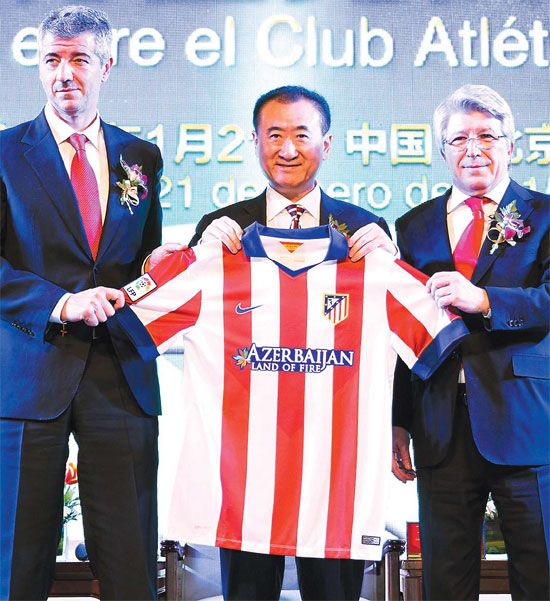China seeks gol in Spanish football
Real estate giant Dalian Wanda's purchase of a 20 percent stake in Atletico Madrid is the latest move by large corporations and high-rollers looking for ways to get closer to La Liga clubs
It may not be long before Chinese soccer players are challenging elite performers like Lionel Messi on the world stage.
A landmark investment by Wang Jianlin, China's second-richest man, has paved the way for the young hopefuls.
|
Wang Jianlin, chairman of Dalian Wanda Group, holds an Atletico Madrid shirt with his name on the back, flanked by Atletico Madrid's President Enrique Cerezo (right) and managing director Miguel Angel Gil after a ceremony in Beijing on Jan 21. Provided to China Daily |
Chinese real estate giant Dalian Wanda Group Co announced on Jan 21 that it has bought a 20 percent stake in leading Spanish club Atletico Madrid for 45 million euros ($52 million), becoming the first Chinese company to invest in a major European soccer team.
Atletico, which won La Liga, Spain's top division, in the 2013-14 season, will provide tailor-made training for young Chinese players in Spain and be involved in Wanda's soccer school program in China.
Wang, chairman of Wanda Group, announcing the investment in Beijing, said, "If three to five Chinese players can manage to ply their trade successfully in top European leagues, then we are not burning money."
Under the agreement, Wanda and Atletico will jointly invest 30 million euros to build a training center for Chinese juniors sent to Spain as part of the company's Future Star youth program with the Chinese Soccer Association. Atletico Madrid will also provide technical support and coaching expertise for Wanda's three soccer academies to be built in China.
While Wanda's purchase is the biggest news of late and is also seen as a way to promote Chinese soccer, the number of Chinese investors looking to enter the profitable soccer business in Europe is on the rise, with Spain being a key destination. These investors know the teams can serve to build a better reputation for them in mature markets and promote themselves to wider audiences.
The negative effects that the economic crisis has had on the finances of the Spanish clubs have led to a strong new wave of investment from China.
Chinese telecommunications giant Huawei also moved to strengthen its relationship with Club Atletico de Madrid with the signing in October of a new sponsorship agreement.
The two-year deal, signed in Shenzhen, the southern Chinese metropolis where Huawei is based, defined Huawei as the club's global partner. As part of the agreement, Huawei had its brand logo placed on the official club shirts and equipment of the team.
"It is important for the club to select companies that share our vision and values. We study carefully our partnerships and alliances to choose the perfect match. For us it is not simply an economic matter," says Maria Teresa Chirivi, who is responsible for the international marketing strategy of Atletico de Madrid.
In other parts of Spain, Club Villarreal has been engaged in a five-year deal for uniforms with Chinese firm Xtep, due to expire this year. Chinese phone maker Doogee also signed a collaboration agreement last February with Villarreal.
"It is an honor to cooperate with such a prestigious and well-known club. We could not think of a better way to enter the European market. We are extremely satisfied with the accord, and it is a key step to become bigger in Spain," said Doogee President Xin Chao during presentation of the deal.
Information technology companies are among those most interested in expanding their brand recognition abroad. Chinese company Qbao.com entered the Spanish soccer market last year with the signature of two agreements with clubs Real Sociedad and Rayo Vallecano.
The teams will be paid 700,000 euros a year over three years. Real Sociedad wore the Qbao.com T-shirt for the first time during a match against Real Madrid. Contrary to the expectations of many, Real Sociedad won 4-2 and made the Chinese sponsor so happy that they received an additional 100,000 euros for its efforts and a personal letter from Qbao's president, Zhang Xiaolei, praising the performance. The team also agreed to host players from the Nanjing Qbao Soccer team in future visits and help them with their training.
Madrid-based Rayo Vallecano received a delegation from Henan Jianye Soccer Club last February. The Spanish team explained that the visit represented a starting point to work on collaboration with the Chinese team.
In the case of Wanda's deal with Atletico, it is only the company's latest initiative under its multiyear deal with the Chinese Soccer Association.
The CFA deal, aimed at boosting the game's profile, was reached in July 2011 and renewed in 2014, with investment of more than 500 million yuan ($80.5 million, 69.5 million euros).
By 2017, Wanda aims to invest 20 million euros a year to support the development of 180 young Chinese players in Spain, according to a statement released on Jan 21.
"I wouldn't rule out Wanda acquiring another soccer club in Europe if this partnership goes well," Wang says. "We want to train more homegrown players and narrow the gap between China and the rest of the world."
Zhang Qing, a senior sports-marketing consultant, says Wanda's investment is a bargain.
"Spending 45 million euros for a 20 percent share is well worth the money as an attempt to show social responsibility in helping the game from the grassroots level, and as a branding campaign for Wanda's business overseas," says Zhang, founder and CEO of sports marketing agency Key-Sports.
Zhang says Wanda's involvement in soccer development, which has been an influential issue for China's top leaders, is a strategic move in line with expansion of its business empire.
Contact the writers through lvchang@chinadaily.com.cn



















